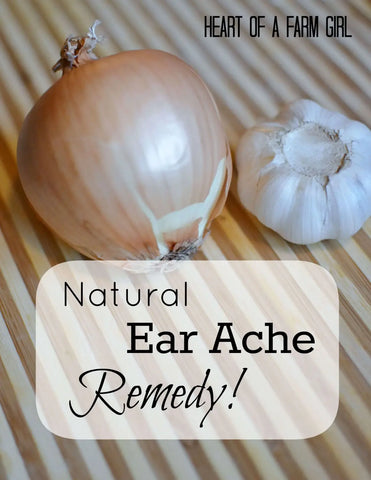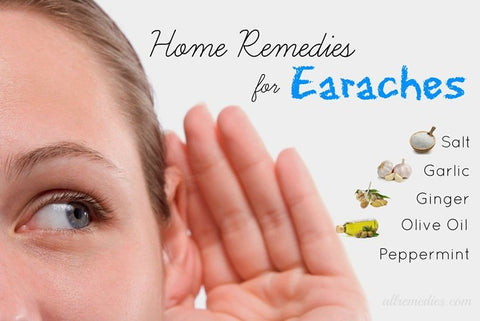Home Remedies for Earaches
12 Home Remedies for Earaches – Fast Ear Pain Relief
Home Remedies
Waiting patiently will usually get rid of an earache, but they aren't pleasant. I've put together a list of 12 home remedies for earaches for children and adults to help quickly relieve pain. We also have tips to avoid ear infections in the future.

Why is my ear in pain?
Ear pain is most commonly associated with fluid buildup behind the ear drum linked to a middle ear infection. This is also known as acute otitis media (AOM).
Thankfully, you don't need antibiotics to treat most ear infections. They are viral infections, not bacterial infections. In fact, using antibiotics may cause adverse reactions.
In “Antibiotics for acute otitis media in children“, which reviewed earache treatments for several thousand children, they noted that, “Adverse events (such as vomiting, diarrhea or rash) occurred more often in children taking antibiotics.” Those children treated with antibiotics did not get better faster than those who simply waited for the infection to pass.
Sometimes ear pain is caused by injury, or water or other fluid trapped in the ear. (This includes swimmers ear.)
Safety Tips for Treating an Ear Infection at Home
For very young children, warm compresses and steam are the safest earache remedies. You may also use plain, warm drops of olive oil or coconut oil. Never use ear drops or oils inside the ear if a child has ear tubes or there is a chance of eardrum perforation.
Older children and adults may use any of the treatments. Do not stick anything deep into your ears, which may cause hearing loss. Please see your healthcare practitioner if pain is extreme, or if your child has a fever over 100.4°F or discharge coming from the ears.

#1 – My Favorite Home Remedy for Ear Pain – Warm Compresses
When I was a little girl, I remember having an ear infection accompanied by one very sore ear. To help me feel better, my mom took a small throw pillow and warmed it up in the oven. She left it in a bit too long, though, and it started to singe. She put the fire out, and I rested my head on one slightly charred pillow – and the pain went away.
Nowadays most houses have microwaves, which make it easier to heat up a warm compress for earache treatment. You can buy or make a compress.
We recommend hot packs from Core Products, a small business located in western Wisconsin. They make soft covered hot/cold packs that we use as foot warmers at night and for treating headaches and earaches.
To make a simple warm compress for ear pain relief, place popcorn or rice into an old sock or small pouch. Seal the end and heat in short bursts until warm. Hot water bottles are a great option if you don't have a microwave – just make sure you don't get the water too hot.
#2 – Steam
If you can’t keep a warm compress on your little one’s sore ear, try plugging in a humidifier or taking a warm shower. (This works for adults, too.) Colds and sore throats lead to swelling and inflammation in the airways. Opening and relaxing airways with warm, moist air can relieve pressure and ease ear pain.
#3 – Garlic Oil
There are dozens of variations of garlic in olive oil for earaches. One of the ones I like best is the “Children's Ear Oil” from Herbal Antibiotics, which combines garlic and eucalyptus for a double anti-bacterial, anti-viral punch. Clear the ear infection and you get rid of the earache.
This should be stored in a tinted bottle in a cool dark location, or in the refrigerator, and used within two weeks.
Children's Ear Oil
Adapted from Herbal Antibiotics
Ingredients
- 5 cloves garlic, finely chopped
- 4 ounces (1/2 cup) good quality olive oil
- 20 drops eucalyptus essential oil
Directions
Place garlic and olive oil in a small sauce pan on low heat. Cook overnight or for eight hours.
Strain, squeezing well to get as much oil as possible out of the garlic. Add eucalyptus essential oil and mix well. Store in a tinted bottle.
To use: Place glass eyedropper in a stream of hot water for 1 minutes (to warm dropper). Dry quickly (to retain heat) and suction up ear oil from bottle. Place 2 drops in both ears every half hour or as often as needed for 2 to 7 days. Never place fluid into the ear if there is any chance of a ruptured eardrum.
#4 – Mullein Oil
Common mullein (Verbascum thapsus) is used for treating respiratory ailments and many other illnesses. (See Weekly Weeder #13 – Common Mullein for more info.) As an earache treatment, infuse the flowers and buds in olive oil, and then apply them to the ear in the same manner as the garlic oil above.
To infuse the flowers in oil, gather enough blooms to partially fill a small jar. Cover with olive oil and let sit for a week or two. Strain and place in a tinted bottle.
I like to let my blossoms set in a shallow bowl or on a plate for an hour or so before putting them in a jar with oil to give any buggies hiding in them a chance to escape. You can also add a clove of chopped garlic to your oil for extra germ fighting.
If you don't have fresh mullein blossoms available, you can buy mullein oil already made, such as the Ear Oil (with mullein and garlic) and mullein oil from Herb Pharm.
Order Herb Pharm Ear Oil for kids here.
They also carry St. John's Wort oil, which is recommended for earaches in the book Prescription for Herbal Healing.
#5 – Essential Oil Ear Ache Treatment Rub
This recipe is adapted from the book “Be Your Own Doctor” by Rachel Weaver, M.H.. Remember, do not apply undiluted essential oils directly to the skin – always use a carrier oil. I don’t recommend this as an earache remedy for small children, who may rub their ears and then rub the oil into their eyes.
Essential Oil Earache Rub
Ingredients
- 1/4 cup olive oil
- 10 drops tea tree essential oil
- 10 drops lavender essential oil
Mix all ingredients and apply gently around the ears at the first sign of infection. Reduces infection and relieves inflammation.
#6 – Herbal Steam Inhalations
Herbal steam inhalations help reduce nasal swelling caused by cold, dry winter air and increase airflow to the eustachian tubes.
To prepare an herbal steam inhalation, simply heat up a pot of water and pour it into a bowl or basin. Add a handful of fresh or dry herbs such as German chamomile, elderberry flowers and/or lemon balm. Lean over the basin and inhale the steam. To get the most out of the treatment, use a large towel to create a tent over your head and trap the steam.
#7 – Apple Cider Vinegar
As I researched home remedies, I've found that people use apple cider vinegar (ACV) to cure just about everything. Earaches/ear infections are no exception. Dee from San Diego, California writes on Earth Clinic:
“Apple cider vinegar also works great when getting an earache. My ENT told me to put some in the ear at the first sign of trouble, leaving it there for a minute then letting the ACV run out the ear… Repeat one more time 12 hours later.”
#8 – Hydrogen Peroxide
Is hydrogen peroxide good for earaches?
My friend, Julie, told me her mom used hydrogen peroxide as a home remedy for earaches for all 12 of her children.
The easiest way to use hydrogen peroxide for earaches is to soak a cotton ball and use it to squeeze a few drops into the ear canal. Gently irrigate the area afterward with warm water to clear any debris.
#9 – Hot Herbal Tea
While you're applying warmth from the outside, you can also apply warmth from the inside. Echinacea, German chamomile, and holy basil are herbs that promote healing and relaxation.
Echinacea boosts the immune system, and fights infections that affect the ear, nose and throat area.
#10 – Onions
Onions are a preferred earache remedy in the book Be Your Own Doctor. Some people simply cut an onion in half and place it over the affected ear. Others gently heat a small portion of the onion until warm but not soft, and tuck the heated onion into the ear as an earache cure. Some people wrap the onion in a warm, moist cloth; others use it directly on the ear.
Another option is to squeeze out some onion juice, heat gently, and put a few drops into the ear. Recommended onion ear compress time is around 10-15 minutes, or until the onion cools. Rest quietly while treating, and gently clean out the ear with warm water after the onion treatment.
#11 – Homeopathic Earache Relief Ear Drops
Homeopathic earache relief drops with herbal extracts, such as Similasan, are popular for earache treatment and have been in use for decades. Similasan earache relief drops active ingredients include:
- Chamomilla 10X – for sensitivity to drafts, soothing
- Mercurius solubilis 15X – relieves fullness, sensitivity to cold
- Sulphur 12X – reduces itchiness, sensitivity to water
#12 – Over the Counter Pain Relievers
Ear pain is linked to inflammation, so nonsteroidal anti-inflammatory medications such as Ibuprofen (Advil, Aleve, Motrin) can help bring relief.
Pain relievers don't heal the infection, so these aren’t my first choice, but they can help alleviate the pain enough so you can rest and heal.
Preventing Ear Pain Before it Starts
If chronic ear infections are a problem, look for environmental factors. Households with smokers have more ear issues, and infants who are breast fed have less issues than their formula fed counterparts.
Food allergies may be linked to ear pain
Food allergies can contribute to chronic ear infections. If you deal with chronic ear infections or other chronic health problems, try adjusting your diet.
Common allergens include dairy, gluten, eggs, soy, peanuts, and tree nuts. Work with your health care provider to see if you can identify any problem foods. Keeping ears clean and dry can also help prevent ear issues.
Xylitol Helps Prevent Ear Infections
Finnish researchers gave daycare children five servings of two pieces of xylitol sweetened gum per day. These children had roughly half as many ear infections.
Another study using larger doses three times per day was not as effective. Please see “Ear Infections and Xylitol” for more information.





Leave a comment